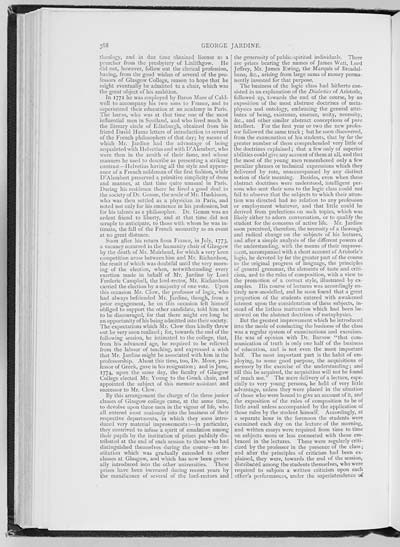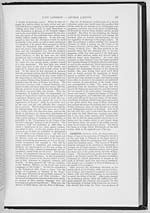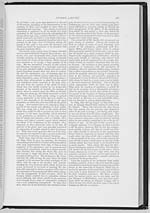388
theology, and in due time obtained license as a
preacher from the presbytery of Linlithgow. He
did not, however, follow out the clerical profession,
having, from the good wishes of several of the pro-
fessors of Glasgow College, reason to hope that he
might eventually be admitted to a chair, which was
the great object of his ambition.
In 1771 he was employed by Baron Mure of Cald-
well to accompany his two sons to France, and to
superintend their education at an academy in Paris.
The baron, who was at that time one of the most
influential men in Scotland, and who lived much in
the literary circle of Edinburgh, obtained from his
friend David Hume letters of introduction to several
of the French philosophers of that day; by means of
which Mr. Jardine had the advantage of being
acquainted with Helvetius and with D'Alembert, who
were then in the zenith of their fame, and whose
manners he used to describe as presenting a striking
contrast�Helvetius having all the style and appear-
ance of a French nobleman of the first fashion, while
D'Alembert preserved a primitive simplicity of dress
and manner, at that time quite unusual in Paris.
During his residence there he lived a good deal in
the society of Dr. Gemm, the uncle of Mr. Huskisson,
who was then settled as a physician in Paris, and
noted not only for his eminence in his profession, but
for his talents as a philosopher. Dr. Gemm was an
ardent friend to liberty, and at that time did not
scruple to anticipate, to those with whom he was in-
timate, the fall of the French monarchy as an event
at no great distance.
Soon after his return from France, in July, 1773,
a vacancy occurred in the humanity chair of Glasgow
by the death of Mr. Muirhead, for which a very keen
competition arose between him and Mr. Richardson,
the result of which was doubtful until the very morn-
ing of the election, when, notwithstanding every
exertion made in behalf of Mr. Jardine by Lord
Frederic Campbell, the lord-rector, Mr. Richardson
carried the election by a majority of one vote. Upon
this occasion Mr. Clow, the professor of logic, who
had always befriended Mr. Jardine, though, from a
prior engagement, he on this occasion felt himself
obliged to support the other candidate, told him not
to be discouraged, for that there might ere long be
an opportunity of his being admitted into their society.
The expectations which Mr. Clow thus kindly threw
out he very soon realized; for, towards the end of the
following session, he intimated to the college, that,
from his advanced age, he required to be relieved
from the labour of teaching, and expressed a wish
that Mr. Jardine might be associated with him in the
professorship. About this time, too, Dr. Moor, pro-
fessor of Greek, gave in his resignation; and in June,
1774, upon the same day, the faculty of Glasgow
College elected Mr. Young to the Greek chair, and
appointed the subject of this memoir assistant and
successor to Mr. Clow.
By this arrangement the charge of the three junior
classes of Glasgow college came, at the same time,
to devolve upon three men in the vigour of life, who
all entered most zealously into the business of their
respective departments, in which they soon intro-
duced very material improvements:�in particular,
they contrived to infuse a spirit of emulation among
their pupils by the institution of prizes publicly dis-
tributed at the end of each session to those who had
distinguished themselves during the course�an in-
stitution which was gradually extended to other
classes at Glasgow, and which has now been gener-
ally introduced into the other universities. These
prizes have been increased during recent years by
the munificence of several of the lord-rectors and
the generosity of public-spirited individuals. There
are prizes bearing the names of James Watt, Lord
Jeffrey, Mr. James Ewing, the Marquis of Breadal-
bane, &c., arising from large sums of money perma-
nently invested for that purpose.
The business of the logic class had hitherto con-
sisted in an explanation of the Dialectics of Aristotle,
followed up, towards the end of the course, by an
exposition of the most abstruse doctrines of meta-
physics and ontology, embracing the general attri-
butes of being, existence, essence, unity, necessity,
&c., and other similar abstract conceptions of pure
intellect. For the first year or two the new profes-
sor followed the same track; but he soon discovered,
from the examination of his students, that by far the
greater number of them comprehended very little of
the doctrines explained; that a few only of superior
abilities could give any account of them at all, and that
the most of the young men remembered only a few
peculiar phrases or technical expressions which they
delivered by rote, unaccompanied by any distinct
notion of their meaning. Besides, even when these
abstract doctrines were understood, intelligent per-
sons who sent their sons to the logic class could not
fail to observe that the subjects to which their atten-
tion was directed had no relation to any profession
or employment whatever, and that little could be
derived from prelections on such topics, which was
likely either to adorn conversation, or to qualify the
student for the concerns of active life. Mr. Jardine
soon perceived, therefore, the necessity of a thorough
and radical change on the subjects of his lectures,
and after a simple analysis of the different powers of
the understanding, with the means of their improve-
ment, accompanied with a short account of Aristotle's
logic, he devoted by far the greater part of the course
to the original progress of language, the principles
of general grammar, the elements of taste and criti-
cism, and to the rules of composition, with a view to
the promotion of a correct style, illustrated by ex-
amples. His course of lectures was accordingly en-
tirely new-modelled, and he soon found that a great
proportion of the students entered with awakened
interest upon the consideration of these subjects, in-
stead of the listless inattention which had been be-
stowed on the abstract doctrines of metaphysics.
But the greatest improvement which he introduced
into the mode of conducting the business of the class
was a regular system of examinations and exercises.
He was of opinion with Dr. Barrow "that com-
munication of truth is only one half of the business
of education, and is not even the most important
half. The most important part is the habit of em-
ploying, to some good purpose, the acquisitions of
memory by the exercise of the understanding; and
till this be acquired, the acquisition will not be found
of much use." The mere delivery of a lecture, espe-
cially to very young persons, he held of very little
advantage, unless they were placed in the situation
of those who were bound to give an account of it, and
the exposition of the rules of composition to be of
little avail unless accompanied by the application of
those rules by the student himself. Accordingly, at
a separate hour in the forenoon the students were
examined each day on the lecture of the morning,
and written essays were required from time to time
on subjects more or less connected with those em-
braced in the lectures. These were regularly criti-
cized by the professor in the presence of the class;
and after the principles of criticism had been ex-
plained, they were, towards the end of the session,
distributed among the students themselves, who were
required to subjoin a written criticism upon each
other's performances, under the superintendence of

![]() Universal Viewer |
Universal Viewer | ![]() Mirador |
Large image | Transcription
Mirador |
Large image | Transcription
![]()

